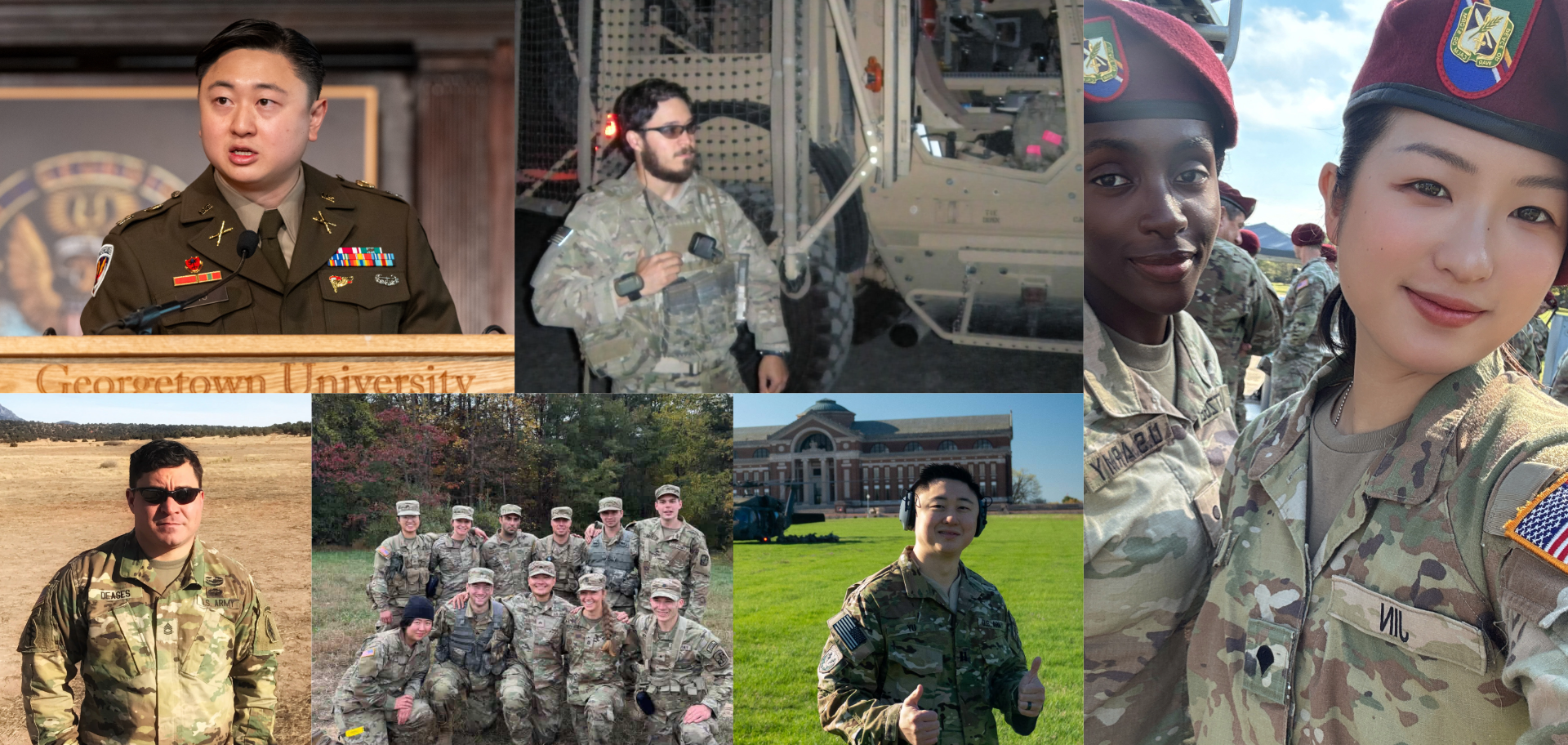After Finding a Military Community at Georgetown, Student Veterans Pay It Forward
For 23 years, Dax Deases’ (MBA’27) life revolved around the Army.
He joined the Army Reserve at age 18, and within three years, moved to an active-duty role in Special Operations and deployed to Afghanistan shortly after 9/11. Over the next two decades, his career in Army intelligence involved three more combat deployments in Afghanistan and Iraq, a Bronze Star Medal for valor and work with senior military leaders around the globe.
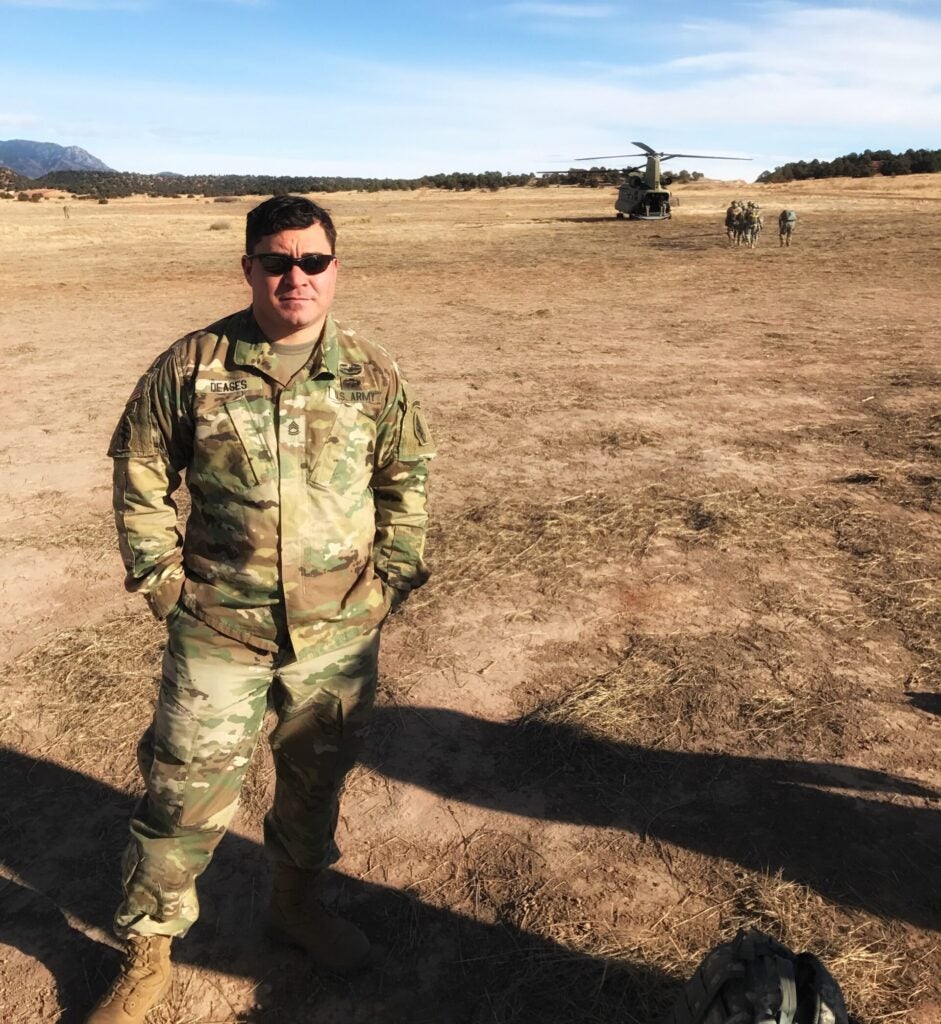
Deases prepares to participate in airborne training with the 10th Special Forces Group in Colorado Springs in 2017. (Photo courtesy of Dax Deases)
These accomplishments are noteworthy within the civilian world. But as he retired from the military in 2023 and looked toward graduate school, Deases worried about fitting in at Georgetown. MBA admissions at the McDonough School of Business is competitive, and Deases felt unsure how to translate his military experience to success in business school.
“I reached out to the McDonough Military Association [MMA], and one of their members was instrumental in how I viewed the application process,” said Deases, a sergeant first class. “We talked about the importance of story and understanding what Georgetown is looking for and how it fits with what I’m looking for. The MMA was instrumental in getting me to apply and making me feel like I could.”
Since enrolling in the Flex MBA program in 2024, Deases has discovered a vast community of military-affiliated students, faculty and staff at Georgetown that understand his background and encourage him to grow in his civilian career.
Over 1,500 military-connected students attend Georgetown, according to the Military and Veterans’ Resource Center (MAVRC). Many of these students are current or former service members who use military educational benefits to earn a master’s degree.
Some grad students, like Deases, Xu Feng “Mike” Yu (MBA’26) and Rachel Jin (G’27), have been inspired to contribute to the robust support they found at Georgetown by connecting fellow student-veterans to military-affiliated university resources, student organizations and other support systems around campus and beyond.
“It’s a very healthy partnership that’s built into this community,” said Yu, a Flex MBA student and assistant professor of military science with the Hoya Battalion. “Georgetown sees us military members and we want to give back, because we recognize that they recognize us.”
Guiding ‘The Future of Our Armed Forces’
Yu, an Army captain and field artillery officer, is in a unique position to support his peers as both a Georgetown student and faculty leader of Georgetown’s Reserve Officer Training Corps (ROTC), also called the Hoya Battalion.
“How grateful I am for that,” he said. “I feel like I’m five birds, one stone. I get to do it all in such a short span.”
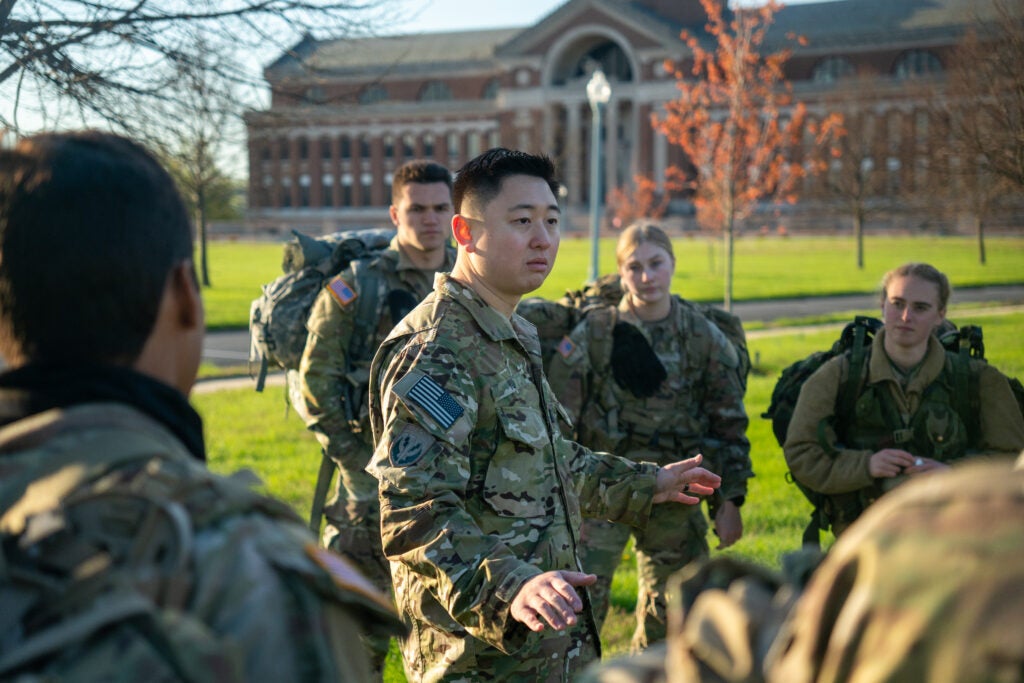
Yu briefs third-year ROTC cadets before an air infiltration simulation during a Joint Field Training Exercise in April 2024. (Photo courtesy of Xu Feng “Mike” Yu)
The Hoya Battalion comprises students from Georgetown, American University, The Catholic University of America, George Washington University and The Institute of World Politics.
As a battalion leader, Yu teaches leadership and operational courses, leads field exercises and molds the next generation of Army officers through formative training. As a grad student and active-duty soldier, he can relate to his cadets’ experiences balancing service and education.
“All these students think at such a strategic and operational level — they’re very book and academic smart, but they know how to apply it in the field and in practical exercises as well,” Yu said. “It makes me feel good that this is the future of our armed forces for this country, and it’s really nice to be a part of their development.”
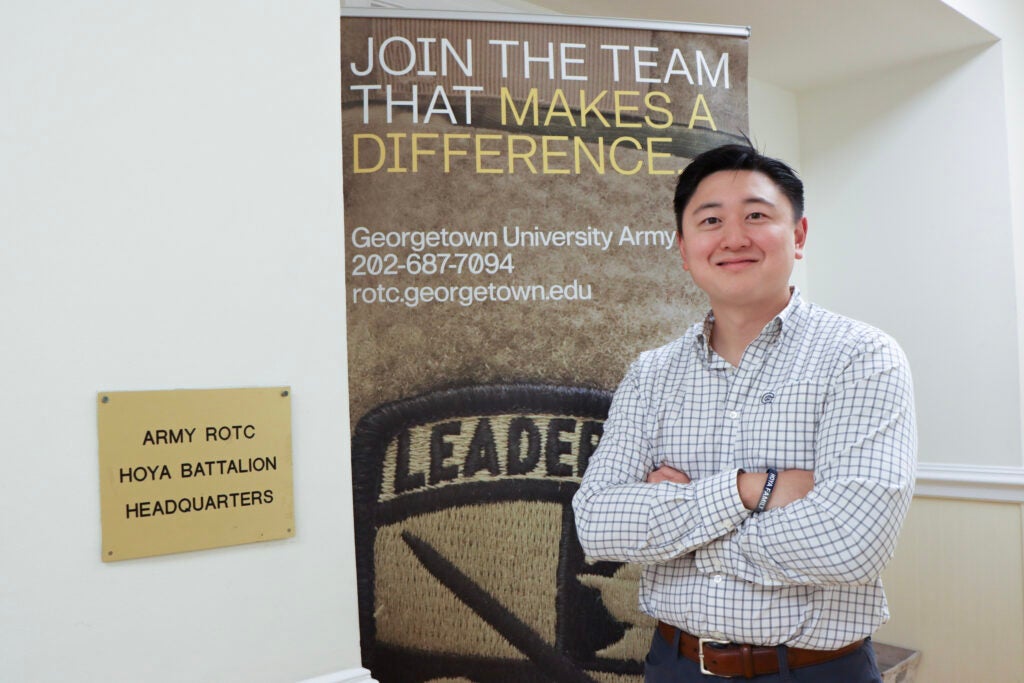
Yu, an Army field artillery officer, is in a unique position to support his peers as both a Georgetown student and faculty leader of Georgetown’s ROTC. (Katie Rice/Georgetown Graduate Studies)
Yu also works to connect Georgetown’s civilian and military-affiliated populations by raising awareness of the ROTC on campus. He strengthened the relationship between Georgetown Athletics, ROTC and MAVRC to revitalize the Color Guard’s presence at sporting events.
During a recent season, Color Guard members traveled with the Hoya men’s basketball team to away games, Yu said.
“We just saw it as a chance to help where we can as an effort of the community,” Yu said. “And in return, there may be athletes or parents of recruits who may be interested in the ROTC.”
Supporting New Students and Service Members
Jin, an E-4 civil affairs specialist, calls joining the Army Reserve one of the best choices she has made.
“I really enjoy the sense of teamwork, the cohesion and being part of a mission that serves a greater purpose,” she said.
She finds that sense of fellowship on campus too, both in the Hoya Battalion, where she is a cadet, and in the MAVRC, where she works as an office coordinator.
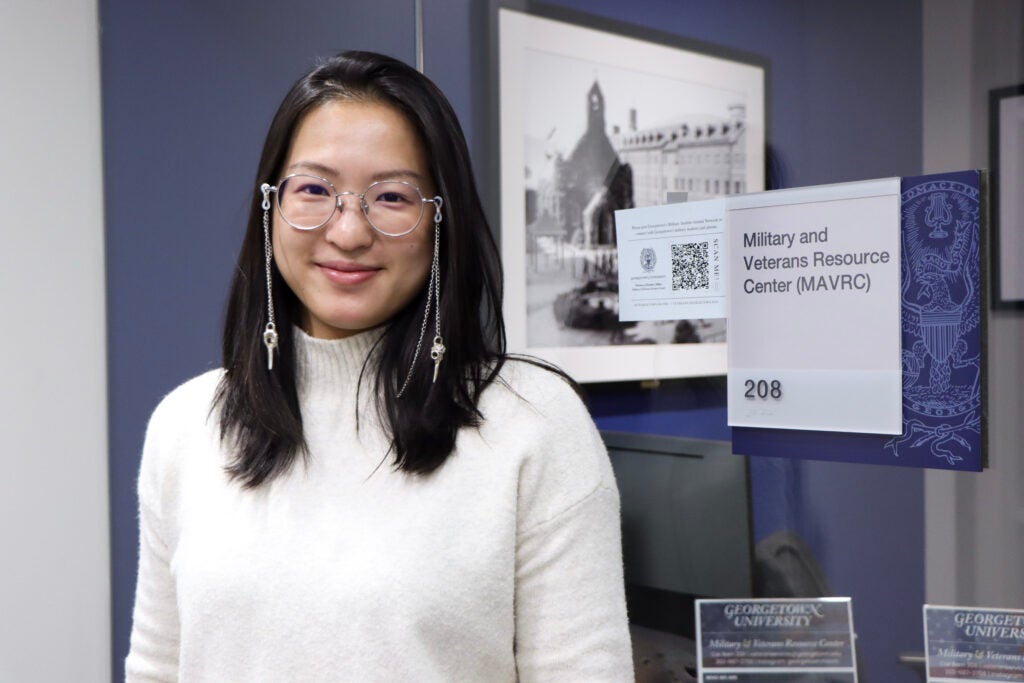
Jin is an Army Reserve civil affairs specialist, student in the security studies program and office coordinator for the MAVRC. (Katie Rice/Georgetown Graduate Studies)
In the Car Barn, just steps from the office of her master’s program in security studies, Jin mans MAVRC’s front desk. She directs student questions on everything from admissions to education benefits and professional networking.
Just a few months ago, she was in these students’ shoes as she navigated Georgetown’s military resources as a new student. The work is rewarding, Jin said, and also comes with the added benefit of working closely with senior officers like MAVRC Director Stephan Murphy, a major in the Army Reserve, and learning from them.
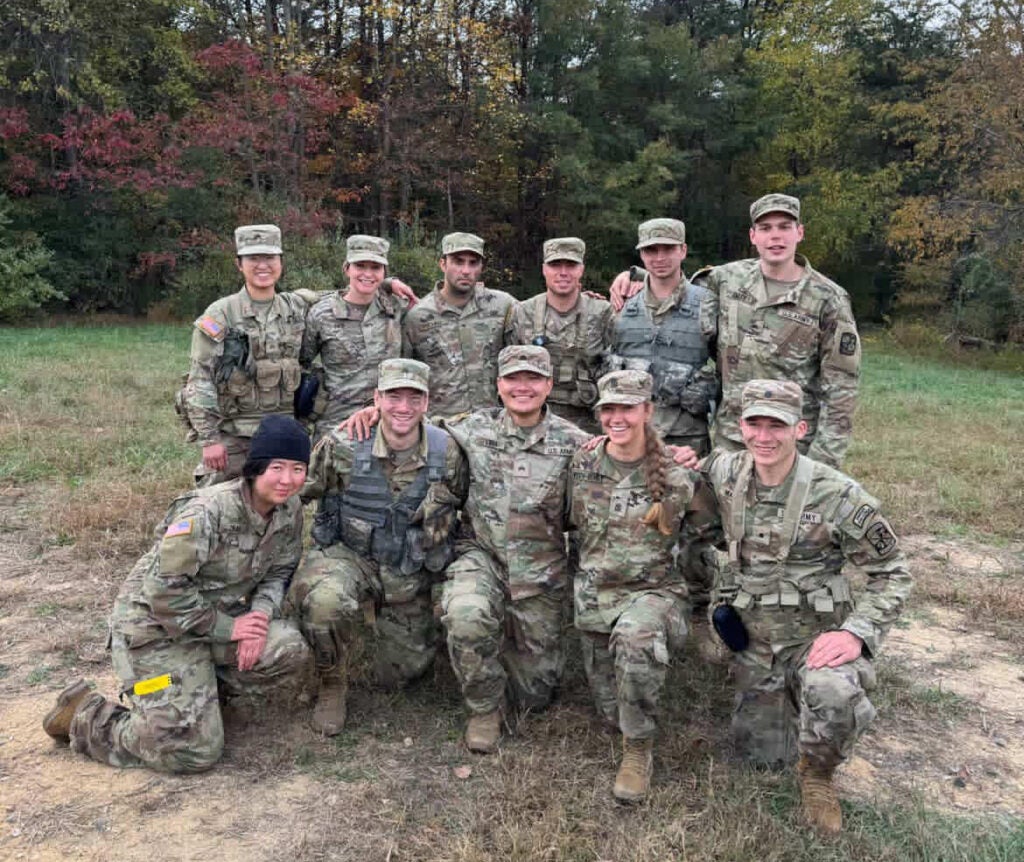
Jin (top row, first on the left) poses with other third-year ROTC cadets after a fall field training exercise in October 2025. (Photo courtesy of Rachel Jin)
“They’re always available to speak about their time in the military, their deployment experiences and things they’ve seen with their soldiers,” she said. “I really appreciate those connections.”
Though Jin is new to the military — she joined in 2023 — she has become a mentor to undergraduate members of the ROTC who are curious about aspects of full-time service and attending grad school as a military member.
“They come to me the most about my experiences in the Army, my MOS [military occupational specialty] and all my prior training,” she said. “A lot of these cadets really haven’t gone through the whole basic combat training or the full junior soldier experience. It’s nice to be able to support each other.”
Assisting in Transitions
Even while balancing his MBA coursework and a job as a defense contractor, Deases still makes time to connect with fellow student-veterans at Georgetown.
“I try to go out of my way when I hear or see a veteran to engage with them about, have they filed for disability? Are they using all the resources available to them?” Deases said. “I derive a lot of meaning from trying to help veterans.”
Deases is particularly enthusiastic about helping service members who have recently separated from duty. He knows how difficult that transition to civilian life, which is often accompanied by a loss of identity, can be.
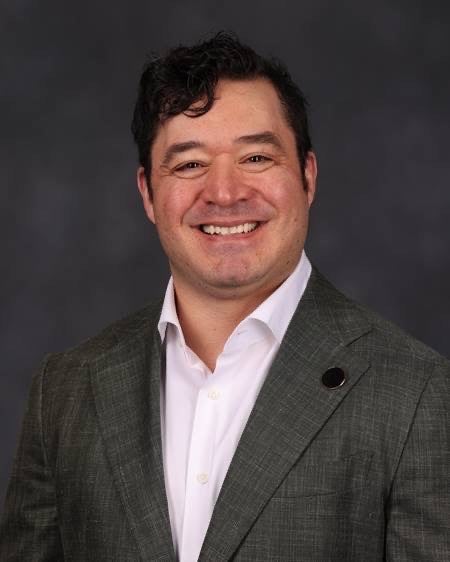
Deases, an Army veteran, is enrolled in the Flex MBA program at the McDonough School of Business. (Photo courtesy of Dax Deases)
Using lessons from his MBA program, Deases recently founded a group, the Meridian Club, to link veterans with business leaders as they pivot to new careers. He is also an ambassador for The Donovan & Bank Foundation, a group designed to help Special Operations-connected veterans with the civilian transition.
Supporting veterans starts with small gestures, Deases said, including in Georgetown’s classrooms. He encourages military-connected faculty, staff and students to share their stories and their civilian peers to be curious and receptive.
“Ask those questions, even if you think they’re cheesy or dumb,” Deases said. “You’re opening that door to connection.”
Lead photo: A collage of images from Deases, Jin and Yu from their military service.
